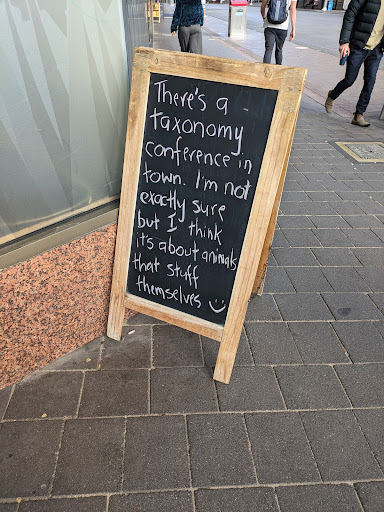Last week was the first TDWG conference I’ve been to since the Fremantle one in 2008, and I was really happy to be back, and not just for the beautiful weather in Hobart!
TDWG (“tadweeg”) is a great acronym and best explained from their own web site (www.tdwg.org):
Historically known as the Taxonomic Databases Working Group, today’s Biodiversity Information Standards (TDWG) is a not-for-profit, scientific and educational association formed to establish international collaboration among the creators, managers and users of biodiversity information and to promote the wider and more effective dissemination and sharing of knowledge about the world’s heritage of biological organisms.
Unlike what the local cafes thought (hats off to The Stagg for this one) , it’s not a taxidermy or really even a taxonomy conference: it’s about biodiversity data and standards around that data – and it attracts people from all over the world.
What I found really amazing was not only the efforts that the organisers put into making sure the hybrid conference worked for both in-person attendees and those attending virtually, but the range of interesting and thought provoking papers that were presented.
It’s always hard to come up with a summary of a conference that goes for a week and involves a lot of thought provoking stuff – I mean, I’ve got about twenty pages of notes to work through – but Mieke and I are giving it a go for our team, so here’s the recap of that recap!
Firstly and we’ve got to claim our own stuff as a highlight – but both Mieke and I gave talks this year. Mieke was talking about translating between the Darwin Core data standard and the Australian Biodiversity Information Standard, and this is a key part of the work we’re doing helping the Department of Climate Change, Energy, the Environment and Water deliver the Biodiversity Data Repository. Meanwhile I was presenting on the work we’ve done on the Restricted Access Species Data (RASD) Service with the Atlas of Living Australia. Note: we’ll update this blog in the future with the recordings when they become available.
The themes that we saw at the conference that really stuck with us included:
- Data quality – a bunch of talks about data quality made us really agree that what defines quality is case dependent on the end user needs. Having some “fitness for purpose” flags (e.g. suitable for modelling) that can be associated with them – this is far more nuanced than the usual “good quality” tags.
- Integration – there were talks on a range of systems like taxonomic backbones, data repositories and other systems – there are a lot of opportunities to synthesize and aggregate data, as well as connect to some significant infrastructure services that can really help with standardisation and connectivity between data sources.
- Terms of useMore and more fields – with the RASD workshop, we also saw some great talks about both the FAIR and CARE principles that really have given us food for thought. These principles – RASD, FAIR and CARE – all provide frameworks for how to format data so that there are appropriate levels of access depending on the content and context. Adding in some additional fields not only to the data stores that we work with, but also the data exchange methods we use, will certainly add a lot to the accessibility and meaningfulness that’s out there in biodiversity data space.
- Artificial Intelligence is out there and being used – we already knew this, but it was great to see a wide range of pragmatic and useful ways in which AI can assist in the efforts across the biodiversity community to solve some big challenges – digitisation, transcription, data processing, identification and data indexing just to name a few!
One of the big things we did differently this year was to help out and support the first ever TDWG Student Prize. This is a really important thing to do – supporting our students is the way to make sure that we’ll have a thriving and active community moving forward. So it’s really important to support our students, and congratulations to Michael Elliott for taking the prize home, and for all the students who were part of the conference.
Any conference is not without a lot of side-bar (or maybe front-bar) talks and Hobart put on a great show for us. We were able to get out and try a bunch of different places with colleagues and friends – we can definitely recommend the Blood Orange Stout from Custom’s House. Hobart is a great place to visit (I’ve been there a few times now) and will be back again in the future as well.
So finally, a big thanks to all the people that made it happen, both in person and virtually. TDWG is pretty unique – it’s a conference that ticks two of my great loves of technology and biodiversity – and I’m really hoping it won’t be another 15 years before I get to another one! If you want to know more about any of the topics touched on in this blog then drop me a line, or start a conversation with us on social media Twitter, LinkedIn or Facebook!
Piers


Comments are closed.